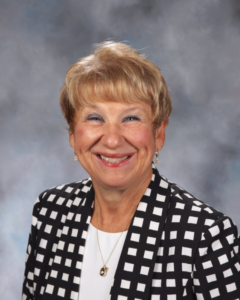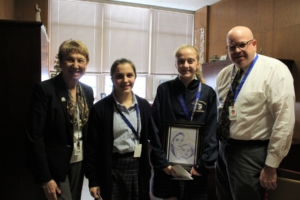Leading Change in the Catholic Sector
Kathleen St. Laurent, principal of the new Preparatory Academy, is bringing her leadership and expertise to the Bishop Connolly and Coyle & Cassidy learning communities in innovative and exciting ways. As a Cohort VIII Fellow in the Lynch Leadership Academy (LLA) at Boston College, Mrs. St. Laurent is designing and implementing educational initiatives focused on increasing student achievement and improving outcomes at both school campuses. She recently sat down with LLA staff to discuss her experience with participating in the LLA Fellowship and the Diocese of Fall River Micro-Academy, and the impact they have on her leadership and the Catholic school sector. Following is an excerpt from LLA’s February 2019 newsletter.

LLA: How did you come to this work? What made you decide you wanted to be an educator? What made you decide to do wanted to do educational leadership?
Kathy: I kind of have an interesting career path. I begin my career as a critical care nurse. I always had a love of science and health and in my career as a nurse I developed a real interest in teaching patients and families. It led me to some great opportunities in teaching adults in an administrative role and deep down I always could see myself in a teaching role in secondary ed, but I was on a career path that was exciting and enjoyable. I had a chance encounter with a principal and she planted the seed. She said, “I think you’d really enjoy working in my high school. Why don’t you come down?” We had the opportunity to speak about it more and I was able to go and visit the school and I just felt I wanted to make that shift [to education]. I did that 28 years ago. I went into it really just wanting to be a good teacher. I had no preparation for secondary ed, so while I was teaching I had to get my teaching certification and learn and work on the job and really loved it.
I didn’t see myself going into administration, but then saw things that I would like to see done differently, and when opportunities came up I really looked at it as a chance to make more of a difference in student learning by being in an administrative role. I moved up into a department chairperson role for Science, and then Vice Principal for Academics, then Principal, which was not a role I would have seen myself in entering teaching.
LLA: Can you talk a little bit about your experience with the Micro-Academy and then maybe compare and contrast that with being in the fellowship?
Kathy: I’ve absolutely loved both experiences! When I think of the fellowship the word that comes to mind is transformative. I have always been our person who loved continuing my education and learning, but I have never been in an experience that was as transformative. I think in part because of the outstanding quality of the professional development that we have; working in a cohort, which is a new experience for me because we’re learning from each other all the time. And then, so significantly, the impact of having an LED (Leadership Effectiveness Director) with you in your own building to take what talking about [in professional development] and really make it real in my school.
The Micro-Academy was just icing on the cake! To have the experience of being with people in my own district and working with the team from Lynch, and seeing how as a school district we can use some of the tools that we were learning- most especially in moving our students forward based on data and having data-informed instruction. Working in a private school, especially in a Catholic community we don’t always have those opportunities to get that type of high-quality instruction, and I think there is a lack of leadership training for people. So this has been wonderful to see my fellow principals getting the same experience. I think it also shows them perhaps they
could explore the fellowship because it’s great to work with this team.
 LLA: You started talking in your last answer a little bit about this, but can you speak to how you see your work at Lynch impacting the Catholic sector?
LLA: You started talking in your last answer a little bit about this, but can you speak to how you see your work at Lynch impacting the Catholic sector?
Kathy: I think that sometimes people think of Catholic schools as just doing their own thing and we most certainly don’t. We very much strive for providing a really high-quality, academically rigorous educational program within the state standards. So being able to take the topics that we’ve learned in the fellowship, and just thinking about leadership and thinking about literacy and math, and all of the instruction, and being able to view the work that we’re doing through that lens elevates it for everybody. In my own building, I was so excited coming off of Summer Institute to really look at the way I did everything- even the way our staff meetings were run, trying to model them after how we do them here [at LLA]. Looking at my own leadership style because I think those of us in Catholic education came into it from different walks of life like myself, so we didn’t necessarily have the educational leadership training that perhaps some public school principals might have to even to become licensed as principals, so this is an opportunity to really build stronger leaders within the Diocese of Fall River. Stronger leaders build stronger school communities and impacts teaching and learning. It has to start with the leadership. I think that having myself and Faith (Piazza, Cohort VIII fellow) as part of the fellowship and those that are in the Micro-Academy, now we have a stronger team of administrators who then can hopefully work together in all of our schools to build stronger programs.
LLA: So everyone sort of getting a dose of the same information at the same time…
Kathy: Yes! And talking about the different challenges. You know, I’ve never worked in a public school so I can’t really speak to that experience, but there are constraints and in a public school and there are constraints in a private school. We don’t have MCAS that we have to worry about, but we do have our own data that we want to make sure we’re meeting the needs of students. We probably have more freedom in terms of hiring and who we want bring in. That being said, we don’t have the fiscal support of the state. We also have to worry about marketing and enrollment.
Principals have to worry about that as well because we are tuition driven. So in a world where the economy is not necessarily stable there’s been a decline in enrollment in Catholic schools. Another challenge that Catholic school principals have to face and our salary scale is generally not what it is in public schools. and we’re trying to recruit and retain really high-quality teachers. In Catholic schools, we ask them to do everything. We all take on multiple roles and we don’t always have the added perks that public schools might have in terms of salary and benefits. We ask our people to do a lot and we don’t always have that reward system in place for them, but we also, on the other hand, have the freedom to really do teaching and learning the way that we know best. So we don’t have constraints on us in that way. I think that’s why this particular program is so innovative and transformative. We can take it as Catholic school leaders we can just run with it in our own buildings where we may not have the extra layers that a public school may have.
LLA: What are you excited about your school right now?
Kathy: We’ve set a goal for ourselves to personalize learning to meet the needs of our population. Diversity in our school comes mostly from students with different learning abilities. We have students who come to us with specialized learning needs. We have students with IEPs and 504 plans as well as traditional learners. We’re trying to move away from a one-size-fits-all approach to teaching and learning to more personalized through our Blended Learning Initiative, which is part of my Big Rocks1 project. Working on teacher development and developing my teacher leaders is really exciting! What I’ve tried to do is take the skills and knowledge I’m learning from the fellowship in terms of adaptive leadership and in terms of real change in the school and use that to help the department chairperson and other teacher leaders to come to the shared vision of what excellence is in education, and to be able to give some of the resources and tools that I’m getting from this program and putting them in place in our school. Coming up with consensus on what it looks like when we do walk-throughs, and then also making every minute of our time together an opportunity for professional development. When Jenne (Colasacco, LLA Executive Director) and then Joe (Dolan, LLA Leadership Effectiveness Director) initially came down to my school that was something that we talked about. Our faculty meetings are no longer about just delivering information. They’re energizers and collaborative work. Really putting the work back on the staff is one thing I’ve learned from working with Joe. I’m really excited about the transformation with getting some individuals who are in teacher and department chair roles and seeing them develop as leaders. I’m trying to model a lot of when I’m seeing [here at LLA] and helping them to learn how to coach teachers and then also letting giving the work back to them and having our discussions together be more collaborative. I’m thinking of my role in a different way- not necessarily being the person who says, “this is the initiative, now you go do it’, but pulling them in on it. So I’ve learned a lot from the program as far as that goes. I’m excited about really making sure that our school is the best it can be and that our students are really being challenged to be college and career ready and using everything that I’m running in the program to move us in that direction.
LLA: Any last thoughts?
Kathy: I’m so excited about the opportunity to be part of this program. As we come almost to the end this is very bittersweet because I’m in a place in my life I am here with many people younger than me. Sometimes I say to Joe ‘I wish I had this 30 years ago’, but he reminds me that I may not have been ready for the experience then. I think that and opportunity to collaborate with such quality educational leaders and individuals aspiring to be principals, and to be able to talk through these important issues and then actually work through it in your own school, it’s an opportunity of a lifetime. I’m so grateful for the opportunity.
1 As part of Summer Institute Fellows participate in a Big Rocks Strategic planning session where they
determine what their top priorities for driving student achievement for the school year will be.
